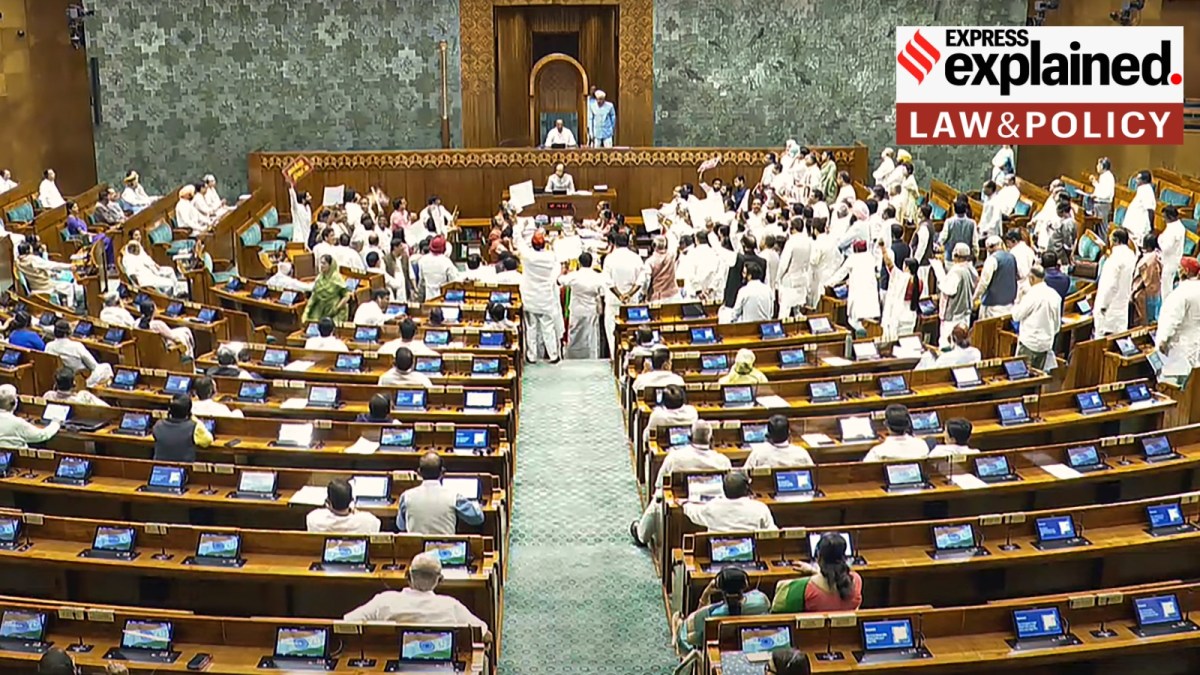The Jan Vishwas (Amendment of Provisions) Bill, 2025, introduced in Lok Sabha last week, seeks to amend 16 Central Acts in order to decriminalise and rationalise certain offences and penalties.
“The 2025 Bill expands this reform agenda to cover 16 Central Acts administered by 10 ministries/departments… to further enhance trust-based governance for ease of living and doing business,” the press release by the Ministry of Commerce and Industry said.
Why was the Jan Vishwash Bill brought in?
A database put together by the Vidhi Centre for Legal Policy contains 882 central laws, 370 of which have criminal provisions for 7,305 crimes. More than 75% of all crimes are defined under laws that regulate areas beyond core criminal justice, such as shipping, taxation, financial institutions, and municipal governance, Vidhi’s research found.
This overreach of criminal law is criticised for a number of reasons.
🔴 There are some inexplicably high punishments for seemingly routine offences. For instance, one can be arrested in India for milking a cow on the street or not providing proper exercise to one’s pet dog.
While many such criminal provisions are rarely enforced, they leave the door open for arbitrary exercise of power by the state and run contrary to the basic legal principle of proportionality in crime and punishment. Often, such laws are a product of outdated notions of morality and an overly paternalistic outlook taken up by the State.
Story continues below this ad
🔴 According to a 2022 report by the Observer Research Foundation, “of the 1,536 laws that govern doing business in India, more than half carry imprisonment clauses. Of the 69,233 compliances that businesses have to follow, 37.8% carry imprisonment clauses. More than half the clauses requiring imprisonment carry a sentence of at least one year.”
Such overreach of criminal law, the report argues, “[has] created barriers to the smooth flow of ideas, organisation, money, entrepreneurship and through them the creation of jobs, wealth and GDP.”
🔴 The excessive criminalisation further burdens India’s already over-burdened legal system. According to the National Judicial Data Grid, as on August 24, there were more than 3.6 crore pending criminal cases in India’s district courts, more than 2.3 crore of which are more than 1 year old.
“The criminal consequences prescribed for technical/procedural lapses and minor defaults, clog the justice delivery system and puts adjudication of serious offences on the back burner,” a Commerce Ministry press release from 2023, when the first Jan Vishwas Bill was introduced, stated, adding that the amendment “would go a long way in reducing undue pressure on the justice system, reduce the pendency of cases and help in a more efficient and effective justice dispensation”.
What does the Bill do?
Story continues below this ad
The 2025 Bill proposes amending 355 provisions, “288 provisions decriminalised to foster ease of doing business, and 67 provisions proposed to be amended to facilitate ease of living”.
The 16 laws that will be amended are: Reserve Bank of India Act, 1934; Drugs and Cosmetics Act, 1940; Road Transport Corporation Act, 1950; Tea Act, 1953; Coir Industry Act, 1953; Handlooms (Reservation of Articles for Production) Act, 1985; Delhi Municipal Corporation Act, 1957; Apprentice Act, 1961; Motor Vehicles Act, 1988 (MVA); New Delhi Municipal Council Act, 1994; Central Silk Board Act, 1948; Textiles Committee Act, 1963; Agricultural and Processed Food Products Export Development Authority Act, 1985; Micro, Small and Medium Enterprises Development Act, 2006; Legal Metrology Act, 2009 (LMA); and Electricity Act, 2003.
What are some of the key features of the Bill?
🔴 The Bill introduces concepts of “warning” and “improvement notice” for first-time offenders in 76 offences under 10 acts, including the MVA, the Apprentice Act, and the LMA.
Story continues below this ad
For instance, a first time offender will be served an improvement notice for the use of non-standard weights and measures, an offence which currently carries a penalty of upto Rs 1 lakh. This will require the offender to rectify the non-compliance within a specified time, failing which they will be punishable with a fine.
🔴 The Bill, like its predecessor, removes imprisonment clauses for minor, technical or procedural defaults for a number of offences, and replaces them with penalties or warnings. For instance, it proposes a fine (between Rs 10,000 and Rs 10 lakh) instead of the existing three-month imprisonment for non-compliance with orders under the Electricity Act, 2023.
🔴 The Bill also proposes rationalisation of penalties. It proposes higher penalties for repeated offences through an automatic 10% increase in the penalty every three years. This is aimed at achieving “deterrence without legislative amendments”.
“The goal of Jan Vishwas is to create a more business-friendly environment and promote ease of living by eliminating unnecessary legal hurdles and simplifying the regulatory landscape,” Commerce Minister Piyush Goyal said on August 18.
Story continues below this ad
This has been a key plank of the NDA government for the last 11 years. Last week, during his Independence Day speech at Red Fort, Prime Minister Narendra Modi reiterated his commitment to getting rid of “unnecessary laws”.
“In our country, there are such laws that can put people in jail for very small things… No one has really paid attention to them… We had introduced a bill in Parliament earlier, and we have brought one again this time,” he said.
The Bill has been referred to the Select Committee of the Lok Sabha, which is supposed to submit its report by the first day of the next session.
